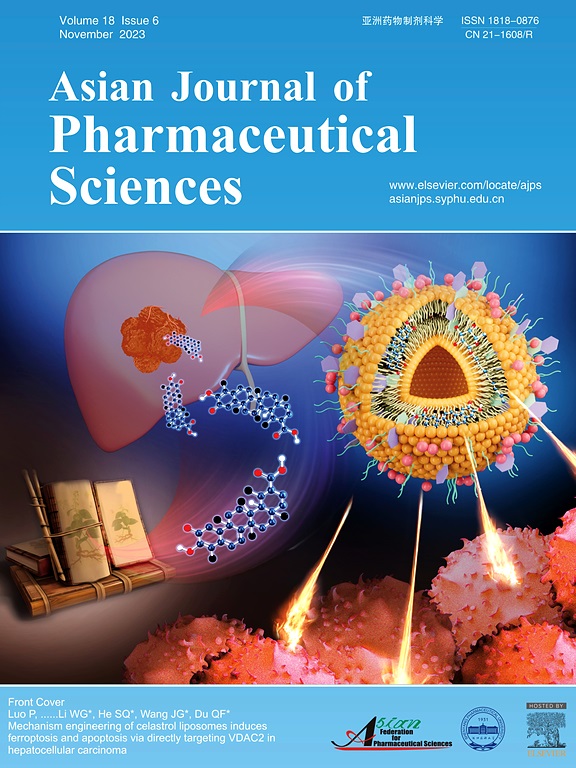Advanced drug delivery platforms target cancer stem cells
IF 11.9
1区 医学
Q1 PHARMACOLOGY & PHARMACY
引用次数: 0
Abstract
Cancer stem cells (CSCs) are a major challenge in cancer therapy. Stem cell-like cells form a unique subpopulation within many tumors, which govern the degree of malignancy by promoting metastasis, recurrence, heterogeneity, and resistance to drug and radiation. Furthermore, these cells can persist in patients even after undergoing multiple cycles of conventional cancer therapy via dormancy, where they no longer dividing but remain active. These may cause cancer recurrence at any time, even years after a supposed cure, and remain invisible to the immune system. Targeting specific surface markers, signaling pathways and tumor microenvironment, which all have a significant effect on CSC function and maintenance, could help to eradicate CSCs and improve patient survival. Combinations of traditional therapies with nano-based drug delivery systems can efficiently target CSCs. Considering the biology and properties of CSCs, we classify recent approaches involving nanoparticle engineering, extracellular matrix modulation, cocktail strategies, multi-stage therapy, CSC defanging, Trojan horse systems, targeted therapy and organelle targeting. We highlight the most recent advances in nanocarrier design and drug delivery technologies to target CSCs, combined with conventional treatment in preclinical and clinical trials. The prospects of these approaches for CSCs elimination and recurrent cancer treatment are discussed.

先进的药物输送平台靶向癌症干细胞
肿瘤干细胞(CSCs)是癌症治疗中的一个主要挑战。干细胞样细胞在许多肿瘤中形成一个独特的亚群,通过促进转移、复发、异质性和对药物和放疗的抵抗来控制恶性程度。此外,即使经过多次常规癌症治疗后,这些细胞也能在患者体内持续存在,因为它们不再分裂,但仍保持活性。这些可能在任何时候导致癌症复发,甚至在所谓的治愈多年后,免疫系统仍然不可见。靶向特异性表面标记物、信号通路和肿瘤微环境对CSC功能和维持均有显著影响,有助于根除CSC,提高患者生存率。传统疗法与纳米药物传递系统的结合可以有效地靶向csc。考虑到CSC的生物学和特性,我们对最近的方法进行了分类,包括纳米颗粒工程、细胞外基质调节、鸡尾酒策略、多阶段治疗、CSC去毒化、特洛伊木马系统、靶向治疗和细胞器靶向。我们重点介绍了靶向CSCs的纳米载体设计和药物输送技术的最新进展,并结合临床前和临床试验中的常规治疗。讨论了这些方法在消除CSCs和治疗复发性癌症中的应用前景。
本文章由计算机程序翻译,如有差异,请以英文原文为准。
求助全文
约1分钟内获得全文
求助全文
来源期刊

Asian Journal of Pharmaceutical Sciences
Pharmacology, Toxicology and Pharmaceutics-Pharmaceutical Science
CiteScore
18.30
自引率
2.90%
发文量
11
审稿时长
14 days
期刊介绍:
The Asian Journal of Pharmaceutical Sciences (AJPS) serves as the official journal of the Asian Federation for Pharmaceutical Sciences (AFPS). Recognized by the Science Citation Index Expanded (SCIE), AJPS offers a platform for the reporting of advancements, production methodologies, technologies, initiatives, and the practical application of scientific knowledge in the field of pharmaceutics. The journal covers a wide range of topics including but not limited to controlled drug release systems, drug targeting, physical pharmacy, pharmacodynamics, pharmacokinetics, pharmacogenomics, biopharmaceutics, drug and prodrug design, pharmaceutical analysis, drug stability, quality control, pharmaceutical engineering, and material sciences.
 求助内容:
求助内容: 应助结果提醒方式:
应助结果提醒方式:


